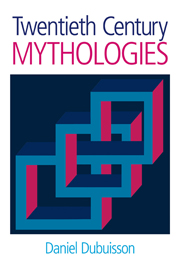Book contents
- Frontmatter
- Epigraph
- Contents
- Foreword by Professor Robert A. Segal
- Preface
- Abbreviations
- Introduction: History and comparative epistemology
- Part I Georges Dumézil, or Society
- 1 The Indo-European background
- 2 The first comparative mythologies
- 3 Durkheim, Mauss, Bourdieu, and Dumézil
- 4 The 1950s: a reorientation
- 5 Comparative and structural evidence
- 6 The new comparative mythology
- Addendum I Theory, history, and the limits of Dumézil's comparativism
- Addendum II Does a Dumézilian theory of religion exist?
- Part II Claude Lévi-Strauss, or the Mind
- Part III Mircea Eliade, or the Sacred
- Conclusion: Modern theories of myth and the history of Western thought
- Bibliography
- Index
3 - Durkheim, Mauss, Bourdieu, and Dumézil
from Part I - Georges Dumézil, or Society
- Frontmatter
- Epigraph
- Contents
- Foreword by Professor Robert A. Segal
- Preface
- Abbreviations
- Introduction: History and comparative epistemology
- Part I Georges Dumézil, or Society
- 1 The Indo-European background
- 2 The first comparative mythologies
- 3 Durkheim, Mauss, Bourdieu, and Dumézil
- 4 The 1950s: a reorientation
- 5 Comparative and structural evidence
- 6 The new comparative mythology
- Addendum I Theory, history, and the limits of Dumézil's comparativism
- Addendum II Does a Dumézilian theory of religion exist?
- Part II Claude Lévi-Strauss, or the Mind
- Part III Mircea Eliade, or the Sacred
- Conclusion: Modern theories of myth and the history of Western thought
- Bibliography
- Index
Summary
Once he was free of Frazerian influence, Dumézil's thought radically changed direction, becoming dominated by the controversial notion of ideology. In fact his entire work took shape and established itself in relation to ideology: to its genesis, its expression, its structure, its role, and so on. And it is this notion that required the most profound refinement and reorientation at the beginning of the 1950s. From this complex evolution we see emerge the profile of an exemplary intellectual itinerary, exemplary for its originality as well as for the problematic raw material it unearthed.
By daring, in his first exposition on the three-function ideology (“La préhistoire des flamines majeurs”, 1938), to juxtapose archaic Indo-Iranian social theory with the no less archaic fossils of Rome - the closed group of major flamens as well as the corresponding divine triad (Jupiter, Mars, and Quirinus) - Dumézil was not merely following an audacious intuition, wreaking havoc in the traditional university norms according to which Archaic Rome and Ancient India were not to be explained with reference to one other. He was also raising, no doubt involuntarily, a general problem that would trouble and obsess him for at least two decades. His oft-repeated and -discussed examination would lead him to adopt an original solution, around 1950, that would oblige him to reconsider his 1938 thesis. Thus his work allows students an exegetical opportunity to exercise their judgement while trying to retrace the path of his lively thought process, which was incredibly erudite and capable of mastering all rhetorical resources with dexterity.
- Type
- Chapter
- Information
- Twentieth Century Mythologies , pp. 25 - 42Publisher: Acumen PublishingPrint publication year: 2006



